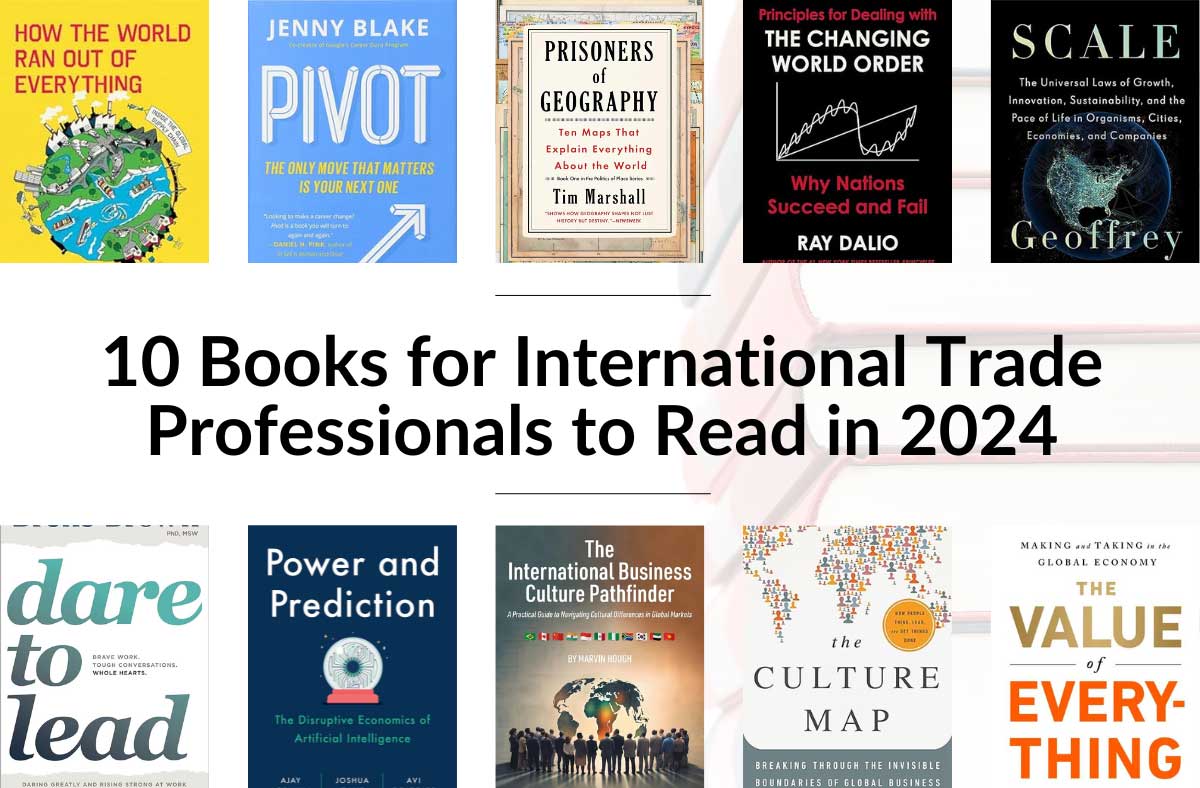
Making the leap from domestic to international markets is an exciting one. Aided by advances in technology, communication, and trade agreements, opportunities have opened up the world over to businesses of all sizes.
As positive as this is, businesses still need to overcome significant hurdles and risks to successfully enter an international market. Not least of these is securing the necessary funding to get a foothold in the new region.
Every element of a company’s international trade activities requires planning with continual adjustments; the financial aspect of international ventures is no exception.
In this month’s #TradeElite Twitter chat, we sought to explore the practical aspects of obtaining the funding needed to enter global markets for the first time. We wanted to know where to get started, how to avoid the biggest trade finance pitfalls and how to know what type of funding is right for your venture. We asked, the experts answered.
Follow the conversation below.
Panelists:
Diane Weklar (@dianeweklar) a business growth and profits expert for small and mid-sized businesses and serial entrepreneur with 7 successful startups. She is also and author of the award-winning best seller, Mastering the Money Maze: 10 Secrets to Winning Business Financing as well as a well-known weekly blog – based out of Southern California
Chris Casemore (@ChrisCasemore) a Canadian Government funding expert, promoting business growth and prosperity. Chris works with Mentorworks, an organization specializing in helping Canadian businesses build proactive funding plans to facilitate growth – based out of Cambridge, Ontario
Shannon Pestun (@agirlsbizbanker) a business banking expert at ATB financial, with a special interest in helping women entrepreneurs get and make more money – based out of Calgary, Alberta
Bernadette Fernandes (@on_the_varanda) an export development, business development and investment expert, with a strong expertise in LATAM markets, founder of the Varanda Network – based out of New Brunswick, Canada
Where does the funding journey begin for businesses looking to enter new international markets? What are some of the first steps they should take?
A1: In a global market, businesses face challenges they may not face in a domestic market. Journey begins with an international business plan that outlines: market risks, opportunities, size, barriers to entry, competition, product, pricing financing, management, etc.#TradeElite
— A Girl’s Biz Banker ?? (@agirlsbizbanker) November 16, 2017
#TradeElite A1 – 1st steps should include identifying your business’ financial needs as it pertains to exporting globally & the cost challenges/barriers to entry in your international market of interest @FITTNews @VarandaNetwork https://t.co/6zq78pTxmK
— bernadette fernandes (@on_the_varanda) November 16, 2017
Get to really know the local market you are considering and the true cost of expanding. #tradeelite
— Diane Weklar (@dianeweklar) November 16, 2017
A1. Gov’t always supports exports – if you are looking to export domestic product, there are start-up grants, @ExportDevCanada has a number of financial products incl. credit insurance to help you, Provincial orgs can help. #TradeElite
— audrey ross (@tresAudrey) November 16, 2017
A1 Don’t overlook connecting with large companies that can provide local references. Create joint ventures, and develop relationships with strong local leaders. #tradeelite
— Diane Weklar (@dianeweklar) November 16, 2017
A1 – From a government funding standpoint, federal and provincial programs can help you along each step. OEF=export manager hiring, EMA/CanExport = trade shows/product certification, and several grants to accommodate increased product demand.#finance #tradefinance #tradeelite
— Chris Casemore (@ChrisCasemore) November 16, 2017
A1 Small Business Administration (SBA) International Trade Loan (ITL) helps small businesses expand in international markets. #tradeelite
— Diane Weklar (@dianeweklar) November 16, 2017
A1 Economic Development agencies at local and state level offer a variety of programs though it varies by locality. #tradeelite
— Diane Weklar (@dianeweklar) November 16, 2017
What types of funding should a business owner seek for international ventures? What are some things to consider?
A2: Ask your lender about the @ExportDevCanada export guarantee program. This may provide additional funding options #TradeElite #tradefinance
— A Girl’s Biz Banker ?? (@agirlsbizbanker) November 16, 2017
A2 – Consider your business’ presence. You can improve it with trade shows eg. Export Market Access (Ontario) and CanExport (new markets) only). Always check the funding eligibility to ensure your company & expenses are eligible. Hold off spend until you’re accepted.#tradeelite
— Chris Casemore (@ChrisCasemore) November 16, 2017
A2: international ventures often have high capital needs. Global trade can be resource intensive. Types of traditional financing can include: working capital and term debt financing #TradeElite #globalbiz
— A Girl’s Biz Banker ?? (@agirlsbizbanker) November 16, 2017
#TradeElite A2 – one of the less costly options to your business tends to be government grants, where there are no strings attached. Also, international partners in-market will often invest in your business product/service giving you cost-effective growth @VarandaNetwork https://t.co/Xfae8MI8JR
— bernadette fernandes (@on_the_varanda) November 16, 2017
A2. Mostly the same type as domestic, but you may find your partners / incubator / angel investment / Line of credit come from international sources. #TradeElite
— audrey ross (@tresAudrey) November 16, 2017
#TradeElite A2 – agreed @tresAudrey. Also, in Canada, #GlobalAffairsCanada has #CanExport, providing up to $100K funding at 50% reimbursement for each new country that you want to grow in @VarandaNetwork https://t.co/Pw2bVrQALI
— bernadette fernandes (@on_the_varanda) November 16, 2017
A2: Make sure you have the proper insurance for exporting as well. Many export grants require this to apply. #tradeelite
— Chris Casemore (@ChrisCasemore) November 16, 2017
How important is it to diversify your finance sources? What are the options? Any to avoid?
A3. Depends on what outcome you want (run the biz, start it then sell it etc.). Most of these funding options come with some sort of string attached. #TradeElite
— audrey ross (@tresAudrey) November 16, 2017
A3: it depends on the stage of your business and financing needs. Diversification of finance sources could include non-traditional sources such as crowd-sourced lending, grants, partnerships, angel investors #TradeElite #globalbiz
— A Girl’s Biz Banker ?? (@agirlsbizbanker) November 16, 2017
#TradeElite A3 – diversification is always important, not only in financing but specifically, it’s important to not be too dependent on one funding source, especially if it’s independent, i.e. non-government, or from a market you’re not familiar with. But, lots of options. https://t.co/sfKoUYJc5u
— bernadette fernandes (@on_the_varanda) November 16, 2017
A3 I agree Audrey, concentration can be a business killer and can lead to getting declined in obtaining funding #tradeelite
— Diane Weklar (@dianeweklar) November 16, 2017
What are some of the pitfalls or common errors businesses make in securing financing for their international ventures? What are some solutions?
A4 – The most common pitfall we see is businesses not having a plan. Market research, budgeting/finance (incl. funding), partnerships, insurance, certifications, and logistics all need to be confirmed before businesses can effectively accommodate a new market.#tradeelite
— Chris Casemore (@ChrisCasemore) November 16, 2017
When I hear a client say they are looking at 10 new priority markets, a part of me shuts down.
— Chris Begley (@ChrisBegleyONT) November 16, 2017
A4: One is the biggest pitfalls I see is not adapting a domestic business plan into an international plan. There are unique risks that need to be considered and your lender will want to see you’ve considered these in your #bizplan #TradeElite #globalbiz
— A Girl’s Biz Banker ?? (@agirlsbizbanker) November 16, 2017
I always advise clients to involve the local (ie non-Canadian) economic development orgs if they are establishing any presence abroad. They will he allies in finding finance #tradeelite https://t.co/ZZ4Ny2KBtl
— Chris Begley (@ChrisBegleyONT) November 16, 2017
What are some of the key success factors in gaining adequate funding? What can make or break a pitch or proposal?
A5 – Be liberal with your budget and consult others that have done what you’re looking to do. Also, keep currency exchange rates in mind and allow flexibility for fluctuations.#tradeelite
— Chris Casemore (@ChrisCasemore) November 16, 2017
A5: I keep focusing on this but…a strong business plan is a key factor in gaining financing for international trade. It’s important to demonstrate the viability of the opportunity #TradeElite #globalbiz
— A Girl’s Biz Banker ?? (@agirlsbizbanker) November 16, 2017
A5 Yes it must make economic sense and fit in with the firm’s vision and business plan. #tradeelite
— Diane Weklar (@dianeweklar) November 16, 2017
#TradeElite A5 – in gaining adequate funding, it must be tied to a global market or export plan… that’s your top success factor in having adequate funding so that you’re not half-way through market entry to find you don’t have enough… very costly @VarandaNetwork https://t.co/3CPCzdyDUo
— bernadette fernandes (@on_the_varanda) November 16, 2017
What are some options available to those who don’t have access to “traditional” collateral?
A6: In the absence of traditional collateral, you may also want to consider other avenues such as grants, partnerships, joint ventures, crowdfunding, angel investors and venture capitalists #TradeElite #tradefinance
— A Girl’s Biz Banker ?? (@agirlsbizbanker) November 16, 2017
For sure! There are so many great options out there if you can show that you have a thoughtful, strategic plan with forecasted benefits and impacts. Businesses are most successful with those options when they proactively plan far in advance.
— Chris Casemore (@ChrisCasemore) November 16, 2017
A6 – Find a good source for government funding info. canadabusiness.ca and https://t.co/ViuEuibHnt are two options that dive into funding details and how to capture non-traditional cash flow planning sources with grants and repayable funding. Don’t be afraid to apply.
— Chris Casemore (@ChrisCasemore) November 16, 2017
A resource is the Canadian #Crowdfunding Directory – an ever evolving and growing directory of active (or beta) online #financing platforms: https://t.co/yGxVfyKuli #TradeElite https://t.co/Y5WmDELGwf
— Barry Y (@yrraByrraB) November 16, 2017
A6 Alternative funding is a great resource especially for small and midsized companies. #tradeelite
— Diane Weklar (@dianeweklar) November 16, 2017
How important is it to secure the lowest possible interest rate? Are there situations where a higher interest loan is still feasible?
A7: In business lending, rates are reflective of risk. If you’re in a high risk category, rates will be higher. #TradeElite #tradefinance
— A Girl’s Biz Banker ?? (@agirlsbizbanker) November 16, 2017
#TradeElite A7 – I suppose if your projections have you yielding more return than the higher interest it would still make sense; however, projections wouldn’t be enough to mitigate the risk of #toohigh interest so, actual revenues, i.e. a pilot approach in-market, is recommended https://t.co/IigZtOkpxC
— bernadette fernandes (@on_the_varanda) November 16, 2017
A7. In most cases you are going to have to accept the interest you get – b/c you don’t have collateral (receiveables) to offer your lender. You are making a big ask. Be smart & pay off loans / debts ASAP. #TradeElite
— audrey ross (@tresAudrey) November 16, 2017
What trade finance skills should you bring in-house rather than outsource? How do you assess the right balance of in-house finance resources and outside resources?
A8. Your CFO needs to be a SUPERSTAR. Risk averse but accepts risk, number savvy but doesn’t hinder selling, seems responsible so banks want to give him money, but edgy enough to make the dealz. #TradeElite
— audrey ross (@tresAudrey) November 16, 2017
#TradeElite A9 – Traditionally, those skills often resided in-house but with lean teams nowadays it’s not always an affordable option & those skills are often inherent in other in-house roles anyway; outsourcing when it’s not your competency is ok https://t.co/MbMeFRBgsv
— bernadette fernandes (@on_the_varanda) November 16, 2017
A 8 Agreed Audrey, expertise can and should be outsourced. Get the best expertise you can, it’s worth it in long run. #tradeelite
— Diane Weklar (@dianeweklar) November 16, 2017
Are there any tools or resources businesses of all sizes can take advantage of to help plan and secure their financing?
A10: Create strong relationships with your professional partners including banker, accountant, lawyer, trade consultant, whatever stage your business is in. All are able to guide you & work towards seeing you achieve your business goals. #EliteTrade #tradefinance #globalbiz
— A Girl’s Biz Banker ?? (@agirlsbizbanker) November 16, 2017
Use @ExportDevCanada to secure insurance and financing options. Check out https://t.co/ViuEuibHnt for daily funding updates, downloadable funding resources, and funding events.#tradeelite
— Chris Casemore (@ChrisCasemore) November 16, 2017
#TradeElite A10 – there are funding experts out there look at ALL the funding options specific to your needs & eligibility, and then actually write the funding application for you with a much higher success rate & a pay when you’re funded model @VarandaNetwork https://t.co/5fWFGknk4B
— bernadette fernandes (@on_the_varanda) November 16, 2017
A 10 Small Bus Admin in US offers all types of training and individual counseling. Most is free. #tradeelite
— Diane Weklar (@dianeweklar) November 16, 2017
Great tips! #CDNbiz can check out the @canadabusiness free listing of programs to help #Export products or services: https://t.co/jsmqLrO77S#TradeElite
— Barry Y (@yrraByrraB) November 16, 2017
Read the rest of the chat and follow future discussions by following the #TradeElite hashtag.
And stay tuned for the next #TradeElite chat, coming up Thursday, December 14 at 2:30-3:30PM ET, and if you haven’t yet, join us on Twitter at @FITTNews.







disqus comments